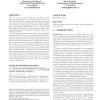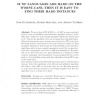106 search results - page 21 / 22 » Proving Lower Bounds Via Pseudo-random Generators |
COMPGEOM
2005
ACM
13 years 9 months ago
2005
ACM
Let S be a set of n points moving on the real line. The kinetic sorting problem is to maintain a data structure on the set S that makes it possible to quickly generate a sorted li...
ALT
1999
Springer
13 years 11 months ago
1999
Springer
We introduce a new model for learning in the presence of noise, which we call the Nasty Noise model. This model generalizes previously considered models of learning with noise. Th...
COCO
2005
Springer
14 years 1 months ago
2005
Springer
We prove that if NP ⊆ BPP, i.e., if SAT is worst-case hard, then for every probabilistic polynomial-time algorithm trying to decide SAT, there exists some polynomially samplable ...
CC
2007
Springer
13 years 7 months ago
2007
Springer
We prove that if NP ⊆ BPP, i.e., if SAT is worst-case hard, then for every probabilistic polynomial-time algorithm trying to decide SAT, there exists some polynomially samplable ...
IEEEPACT
1998
IEEE
13 years 11 months ago
1998
IEEE
Compile-time scheduling is one approach to extract parallelism which has proved effective when the execution behavior is predictable. Unfortunately, the performance of most priori...


